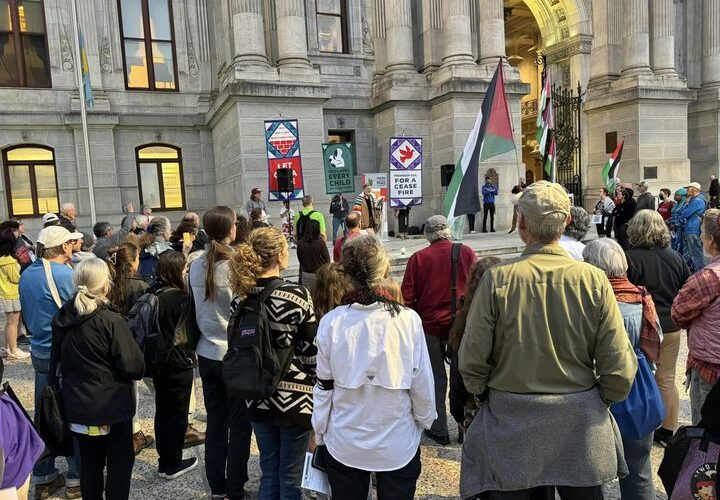The Kingdom Belongs to the Children
Friends,
I think about what’s happening in Palestine almost every day. Some days, I have to stop myself from thinking about it, or it just goes around and around in my head.
It comes up most often when I’m with Raphael, and I see how he’s growing up in a world where everyone is so good to him. When he walks down our street, our neighbors smile and wave at him. When he shows up at our church, everyone competes for his attention. You all adore him. And that’s how a kid should grow up.
And then I think about the children in Gaza. Last week, I read an article in the New York Times by Dr. Feroze Sidhwa, a surgeon who worked at the European Hospital in Khan Younis, Gaza, for two weeks in March and April.
In the article, Dr. Sidhwa shares the results of a survey he conducted of 65 American healthcare workers who have been volunteering in Gaza this past year. He asked them about what they’ve been seeing.
I want to share some of their responses with you. But before I do that, I want to say two things.
First, what they have to say is horrifying. If you aren’t prepared to read this right now, please come back to it at another time.
And second, last Tuesday, Jenny and I took the train to Philadelphia City Hall to attend a protest for peace in Gaza organized by Samuel Kuttab, Prayers for Peace Alliance, and Mennonite Action.
Of all the speakers, I was most touched by Jonathan Kuttab, a former member of Ambler Mennonite Church who has been working for peace and justice in Palestine for years.
Jonathan said many wise things, but what stood out to me was what he said about clarity. There are a lot of voices clamoring to explain what Israel (sponsored by the US) is doing in Palestine right now, who speak for larger political forces and ideologies, who want us to believe one thing or another. What we must do, Jonathan said, is be clear in ourselves, in what we believe.
So here is what I believe. First, I believe in Jesus. And Jesus says that children are the greatest in the kingdom of God. He says that we must become like children. He says that whoever welcomes a child in his name welcomes him. And he says that if we cause a little one to fall down, it would be better for us to have a millstone hung around our necks and be thrown into the sea.
Jesus is on the side of the children, especially when they are being harmed. That is what I believe.
And second, I believe that when something is big and complicated, we should start by listening to the testimony of credible witnesses. People who have seen with their own eyes what’s happening. I can’t imagine any witnesses more credible than people who are risking their own lives in a warzone in order to save the lives of children.
So here is the testimony of the American healthcare workers who have been volunteering in Gaza:
“I’ve seen violence and worked in conflict zones. But of the many things that stood out about working in a hospital in Gaza, one got to me: Nearly every day I was there, I saw a new young child who had been shot in the head or the chest, virtually all of whom went on to die. Thirteen in total.”
“One night in the emergency department, over the course of four hours, I saw six children between the ages of 5 and 12, all with single gunshot wounds to the skull.”
“Pediatric gunshot-wound patients were treated on the floor, often bleeding out on the floor of the hospital due to lack of space, equipment, staff and support.”
“I saw a child who had been shot in the jaw. He stared at me while he choked on his own blood as I tried to suction it out with a broken suction unit.”
“One 4-year-old girl with major burns to her body was completely dissociated. She was staring out into space, humming a lullaby to herself. Not crying, but shaking and in utter shock.”
“Every child I spent time with looked to me as a mother, for safety. They were lacking emotional security and physical security and it was very obvious to us from the way they clung to us and asked us to take them home in our suitcases.”
“One child who had lost all his family wished he had been killed, too, saying: ‘Everyone I love is in heaven. I don’t want to be here anymore.'”
“Many children would not speak for days, even with their family at bedside. One child would not accept a gift I brought of a little plastic car, because she did not want to touch or talk to anyone but her father.”
“A child was brought in with her father after their home was bombed. Her father lay naked, covered by a thin plastic sheet in the bed next to her, unable to move while he listened to her screams. She was injured, but she wasn’t screaming in pain. She was screaming for her mother and father, and was afraid until I put her in my lap and comforted her until she fell asleep.”
I can’t hold all this inside me. It’s too much, and it’s too awful. So what I’m trying to do here, like Jonathan Kuttab said, is to start by being clear. By saying what is happening. By saying that it is not okay and that it has to stop. By saying it to other people and to God. And then to keep asking God what role he has for me and for our church in the saving work he must do—must surely be doing already—because he is a God who hears the prayers of children.
Love,
Pastor Jacob

